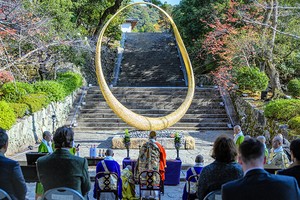By KENRO KURODA/ Staff Writer
September 7, 2024 at 11:10 JST
A capsule hotel in Tokyo is collecting and analyzing heart rates, breathing frequencies and other data of guests to improve the quality of sleep.
Information technology provider NTT Data Japan Corp. opened the Sleep Lab hotel on Aug. 9 in front of Shinagawa Station in the capital.
The data collected will also be used to help food makers, drink companies and bedclothes manufacturers develop improved sleep-related products.
NTT Data teamed with sleep analysis service supplier Nine Hours Inc. for the project.
The hotel has 70 rooms exclusively for men.
The average charge per night is 8,000 yen ($54) to 9,000 yen. Prices may vary depending on the season and day of the week.
Project officials expect a wide range of guests, such as working people, tourists and ordinary consumers.
Each capsule unit measures 1.2 meters by 1.2 meters and is around 2.1 meters deep.
An infrared camera and a directional microphone have been installed above the heads of the prone guests.
A sensor beneath the bed sheet detects body movements.
The devices are designed to record sleeping hours, the number of rolls and apneas, snoring volume and other details of the slumbers.
Guests can receive reports about their sleeps afterward. The anonymous data will be sold to companies with the guests’ consent.
Bedclothes and food items designed to promote sound sleep are sold at the hotel, along with freebies. Guests who try these items can provide feedback to the manufacturers.
“Our hope is that the analysis results will be used to verify the products’ effectiveness and to develop new goods,” said a representative of the project.
The hotel, operated by Nine Hours, is housed in an NTT Data commercial complex.
Drawing on NTT Data’s business expertise, Nine Hours, which already offers sleeping data to corporate customers, is aiming for more effective use of the information through the project.
Their future plans include the use of a deep body temperature sensor under NTT development and the extension of the program to cover women.




















A peek through the music industry’s curtain at the producers who harnessed social media to help their idols go global.
A series based on diplomatic documents declassified by Japan’s Foreign Ministry
Here is a collection of first-hand accounts by “hibakusha” atomic bomb survivors.
Cooking experts, chefs and others involved in the field of food introduce their special recipes intertwined with their paths in life.
A series about Japanese-Americans and their memories of World War II